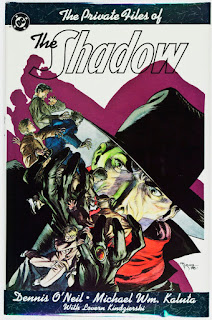I recently purchased a copy of the late-80s collection, The Private Files of the Shadow, which reprinted 5 of the 12 issues published by DC Comics in 1973-74. These were the stories written by legendary writer & editor Dennis O'Neil -- who passed away several months back -- and drawn by iconic Shadow artist Michael W. Kaluta. It also included a then-new story from Kaluta, who did writing and art for the additional tale. Classic!
I admit, I wasn't sure what to expect with this collection. I'd read their Marvel graphic novel from 1989, which included inks by Russ Heath, who's a great artist but whose style overwhelmed the light and airy linework of Kaluta, and didn't remember much from that book -- at least, not enough that I would want to re-read with any urgency. So, when I started reading and found these stories to be just what I was hoping for and looking for, I was more than pleasantly surprised.
O'Neil has a long introduction that puts the comics into proper context. Though probably best-known from the radio drama, O'Neil felt that didn't properly convey the character of the Shadow. The Shadow of the radio drama was a bit more lenient, preferring to capture rather than kill those he pursued. O'Neil wanted to take the character back to his pulp roots, where the Shadow was a ruthless vigilante, hell-bent on meting out justice to those of the criminal underclass, a character without the extranormal powers ascribed to his radio doppelganger -- most importantly, the power of invisibility. This Shadow utilized twin semi-automatic pistols to take care of crime.
And that's how the Shadow is portrayed in these comics. And it's great. This Shadow is indefatigable, pursuing his victims with the able assistance of his entourage, including Margo Lane, Shrevvy, and Burbank, until he puts them to rest. There's a fair bit of investigation by Lamont Cranston, the alter-ego of the Shadow, along with undercover work by his cohort mentioned above, though truncated by the page limit of the comics, but in the end, the Shadow always provides a cathartic climax with his twin pistols. It is also entertaining to see the Shadow get out of seemingly impossible traps and situations -- such as when dozens of Chinese henchmen collapse on the Shadow, appearing to tie him up in a drape or rug, before presenting his body to their leader, only to discover that one of their own was inside when they inflicted the death blows -- with no explanation, other than: he's the Shadow. Personally, I prefer this. The Shadow is a wisp of smoke in the corners of an alley, handing out justice on an elemental level, and I don't need any explanation of how he manages to do what he does; I just need him to succeed, and succeed with aplomb and panache, while cackling throughout it all.
O'Neil is more than ably assisted by the moodily beautiful artwork of Mike Kaluta. A master craftsman, whose linework is delicate and bold at the same time, with a marked excellence rarely achieved by comic artists, these stories could not work as well as they do without Kaluta. He sets the mood from page one, with heavy fog, deep shadows, stark angles, all coupled with an ability to draw bodies in motion and classic vehicles in a manner that pulls you into the story -- it's a tour-de-force of cartooning. These are dark images, complementing the dark themes being put forth by O'Neil. Kaluta's fine linework meshes wonderfully to produce a classic look that grounds these stories in the 1930. But the images are also just plain beautiful to look at, absent the narrative. Kaluta has long been a top-tier artist, but this combination of art and character (abetted by O'Neil's stories) is one of the best examples of what comics can achieve, as far as high art. Especially if you're one who isn't prejudiced against Low Art TM (the pulps) being considered High Art TM.
-chris










No comments:
Post a Comment